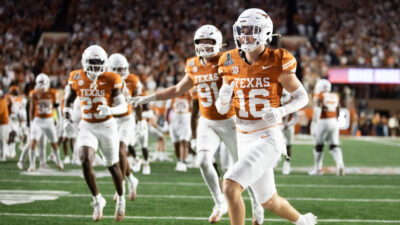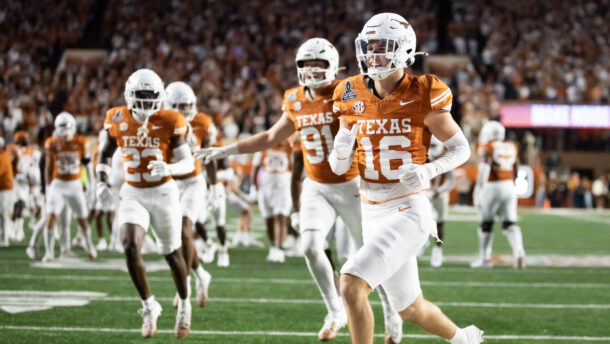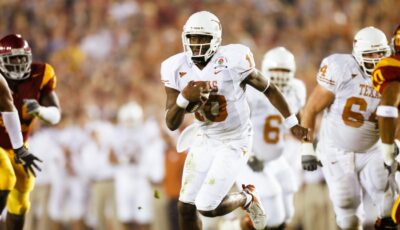
First and 10: Bobby Bowden and the SEC? It almost happened. Twice
By Matt Hayes
Published:
1. I don’t want to get on a soapbox, but …
Years ago, and months after Bobby Bowden’s career as a football coach had finally come to an end in 2009, he sat in his son Terry’s football office at North Alabama and recounted those fateful last few weeks.
His mind wasn’t far removed from the dynasty he built at Florida State, from the decades of reaching and serving young men well beyond the football field.
It all ended ugly at Florida State because coach-in-waiting scenarios almost always do, and this one with Jimbo Fisher was no exception. And because when you give your word of one more year to Bobby Bowden, well, a man’s word is a man’s word.
“But I’m not bitter,” Bowden said that perfect spring day. “I’m glad I get to wake up every morning.”
That throwaway line wasn’t exactly what you think. He then told me the story of when he was an assistant coach at West Virginia, and his good friend, Ed Starling, was assistant athletic director at Marshall.
Starling wanted Bowden as head coach at Marshall, and drove to Morgantown to speak with Bobby and his wife, Ann. They talked deep into the night on a weekday at the Bowden family home, before Bowden declined the job to stay at WVU.
Two years later, while returning home from game at East Carolina, a plane crashed outside of Huntington, W.Va., killing all 75 on board: 36 Marshall players, 29 administrators and boosters, 5 coaches and 5 crew members.
One of those five coaches was Thundering Herd head coach Rick Tolley.
“That could’ve been me,” Bowden said softly, staring out at the North Alabama practice field. “I’m grateful for every day, the good and the bad.”
Bowden died Sunday from pancreatic cancer, 91 years of being grateful and generous – and a life as one of the greatest coaches in the history of college football.
His work on the field and his service off it touched so many lives. From players to assistant coaches, administrators to fans, CEO’s to prison inmates, everyone heard and loved the Word of Bobby.
He was a rare exception in a profession where coaches are always looking for the next big contract and/or the next big job. He stayed true to FSU for 44 years, despite job offers from some blueblood programs – most notably Alabama and LSU.
When Bill Curry resigned at Alabama after the 1989 season, Crimson Tide officials called Bowden and offered him the job without an interview. FSU was in the third year of a remarkable 14-year run of top-5 finishes under Bowden but played as an independent.
Bowden said no, just like he told LSU no 10 years earlier. In October of 1979, Bowden was just beginning to build a winner at FSU and did so by playing anyone, anywhere.
This time, it was LSU in Death Valley.
“I went into that game thinking, if we can beat (LSU) down there, we can get it done, here,” Bowden said.
FSU won 24-19, and on the flight home to Tallahassee, Bobby and Ann decided to stay at FSU if the administration gave him what he wanted. They did, and LSU hired Bo Rein.
Not long after Rein was hired, he was on a recruiting trip when a plane carrying the new LSU coach went down in the Atlantic Ocean. He never coached at game at LSU.
“That could’ve been me,” Bowden said again.
He paused for a moment, and looked back at me and said matter of factly, “When I tell you I’m blessed, son, I mean it.”
He won championships, and loved his family and his God. And he woke up every morning for 91 years, when it could’ve been so much different.
A life well lived.
2. Under the radar friendship
Jimbo Fisher heard the news of Bowden’s declining health last month before he left College Station for SEC Media Days.
Despite what many believe – and the lunacy that was posted all over social media – Bowden never directly blamed Fisher for not getting a final season at FSU.
“I don’t blame Jimbo, we’re all in the same profession – hired to be fired,” Bowden said that day at North Alabama.
But Bowden’s sons — particularly Terry and Tommy — weren’t thrilled with Fisher in 2009, a man they coached as a player at Samford and coached with at Auburn. But they eventually made peace with Fisher and saw it for what it was: a mistake by FSU president TK Wetherell to offer Bowden one more year and not follow through.
Fisher played the cards he was dealt as coach-in-waiting. He was a hot commodity, and was being pursued by other universities – and legendary agent Jimmy Sexton was working every angle.
“I think he’s one of the greatest – not only the greatest football coach that ever lived – human beings that’s ever lived,” Fisher said of Bowden in July. “The ministry he preaches to his players and what he’s meant to not only his players, but to me as a mentor … I just talked to him about a month ago. We had a long conversation on the phone. I call periodically and we stay very close. People don’t realize he and I are very close.”
3. Bobby and the SEC connection
When the SEC was interested in expanding to 12 teams in the early 1990s, Florida State was considered a prime candidate.
Florida didn’t want another team from the state of Florida in the league, but SEC commissioner Roy Kramer was desperate to grow the league with significant additions and/or a unique championship plan (see: SEC Championship Game).
FSU was playing as an independent, and had just begin to hit its national power stride when talks with the SEC heated up in 1990. When the university administration asked Bowden about conference affiliation, he said he preferred the ACC because the road to winning it all was easier.
Some SEC schools weren’t thrilled about FSU choosing the ACC over the SEC, and a few – most notably, LSU and athletic director Joe Dean – said they would no longer schedule FSU because of the snub.
Four years later, Auburn coach Terry Bowden took his team into Gainesville against the No. 1 Gators and built a 22-14 halftime lead. Terry Bowden, ever the motivator (he learned that from Bobby), called his dad amid the halftime locker room.
Bobby’s Seminoles and the Gators were bitter rivals, and after four years of games, there was plenty of acrimony built between Bowden and Florida coach Steve Spurrier.
“Hey, Dad,” Terry said after Bobby picked up the phone. “What about that!”
The locker room erupted.
Auburn went on to win the game with a last-second touchdown pass from Patrick Nix (Bo’s father) to Frank Sanders.
4. Expanding the nonsense
The SEC has expanded and invited Texas and Oklahoma. The natural next step must mean more expansion.
Or not.
“You add for value,” one SEC AD told me recently. “You don’t add just to add teams and get to a specific number.”
In other words, the idea of the SEC adding another institution (or institutions) isn’t exactly a top priority. So forget about the report that the SEC is interested in adding FSU and Clemson.
While there’s value in Clemson because of the state of the program, it doesn’t add anything to the league’s footprint. There are likely two programs that could add value and geographic impact to the SEC, and neither is likely moving: Notre Dame and USC.
Notre Dame is confident it can cobble together a strong enough schedule as an independent to earn College Football Playoff recognition, and has an avenue to access the current and future CFP. It also has the ability to sell its games to a wide variety of suitors in the near future, including NBC, CBS, and any number of streaming sites.
USC is set (for now) in the Pac-12, but revenue will soon be an issue. The Trojans can’t sit back in the Pac-12 and expect to compete with the elite of the SEC and Big Ten, when those conferences will be distributing as much as $25 million more annually to their teams.
If the Pac-12 doesn’t come up with a comparable revenue distribution, USC could move to independent status and sell its games like Notre Dame. It could also join another conference.
5. The Weekly Five
In honor of a life well lived, here are the 5 best players at FSU under Bobby Bowden:
- 1. CB Deion Sanders
- 2. QB Charlie Ward
- 3. LB Derrick Brooks
- 4. RB Warrick Dunn
- 5. QB Chris Weinke
6. Your tape is your résumé
An NFL scout breaks down a draft-eligible SEC player. This week: South Carolina DE Kingsley Enagbare.
“He’s really raw, but holy cow, does he have a motor. The guy plays with a reckless abandon. He’s violent out there. Now, sometimes he’s too aggressive and it gets him in trouble because he’s out of position or he’s overrunning plays. There’s also an issue with him reading snaps. He’s not that proficient – and it’s a very underrated value. He reminds me a little of Josh Allen at Kentucky, just massive and athletic and raw talent. Allen was far ahead of where (Enagbare) is right now as far as skill set, but I can see (Enagbare) taking a big leap this season. He’s close to 270 (pounds) right now, and he’s versatile. He can be an end in a 4-3 or a rush end in a 3-4.”
7. Powered Up
This week’s Power Poll, and one big thing: the ceiling and basement for each team.
1. Georgia: Ceiling (14 wins); basement (11 wins).
2. Alabama: Ceiling (14 wins); basement (11 wins).
3. Texas A&M: Ceiling (11 wins); basement (8 wins).
4. Florida: Ceiling (11 wins); basement (7 wins).
5. LSU: Ceiling (10 wins); basement (7 wins).
6. Ole Miss: Ceiling (9 wins); basement (6 wins).
7. Missouri: Ceiling (9 wins); basement (7 wins).
8. Auburn: Ceiling (9 wins); basement (6 wins).
9. Kentucky: Ceiling (8 wins); basement (5 wins).
10. Arkansas: Ceiling (8 wins); basement (5 wins).
11. Mississippi State: Ceiling (8 wins); basement (4 wins).
12. Tennessee: Ceiling (6 wins); basement (2 wins).
13. South Carolina : Ceiling (5 wins); basement (2 wins).
14. Vanderbilt: Ceiling (4 wins); basement (1 win).
8. Ask and you shall receive
Matt: With more college football expansion on the way, do you see the major conferences breaking away and using a commissioner to run the group, sort of like the NFL? Wouldn’t Greg Sankey be the perfect choice for that job?
Kevin Smith
Atlanta
Kevin: The major conferences already have “broken away” from the other schools. They’re called the “Autonomous 5” for a reason – they, for the most part, govern themselves. The only area in which they don’t is enforcement, which is essentially farmed out to the NCAA because it’s too cost-prohibitive for the A5 schools (Power 5 in layman’s terms) to have it in-house.
That said, we’re getting close to a point where the Power 5 schools may have no choice but to use their own enforcement. NCAA president Mark Emmert has said in the past month that he believes the system to revert to a more hands-off approach to student-athletes. Let’s say in that world, where the top 65 teams have their own “league” (it will be considered a different “division” by NCAA standards, and could be changed as soon as this year with pending reclassification talks), there won’t be a “commissioner” per se. There may be a head of enforcement on and off the field, but that’s all the power the person would have.
The SEC and Big Ten won’t willingly enter into a “league” and begin to share revenue with the other universities. The only way this dream league happens is if each of the specific conferences can still negotiate their own media rights deals, and keep the money within their conferences. The only “shared” money in that sense would be whatever is generated from the College Football Playoff, which will be a considerable amount (estimated at more than $1 billion a year).
Some quick math: $1 billion divided by 65 (teams) is $15.38 million per year. But the Group of 5 schools and FCS and lower divisions would still receive some amount of that Playoff payout.
9. Numbers
100. Ole Miss became the first team in the SEC to announce that 100% of players and staff are vaccinated. That’s a significant step, especially considering a high majority of amateur and professional teams aren’t close to 90%.
This isn’t political, and everyone has his/her right to make their own decision. But it is simple math: The more players and staff vaccinated, the less risk of an outbreak forcing a forfeit.
10. Quote to note
Alabama coach Nick Saban: “Bobby Bowden was a wonderful friend whose accomplishments as a coach are only surpassed by the character and class he displayed as a husband, father, mentor and friend.
“His passing is a loss for everyone but should be seen as a chance to celebrate a life remarkably well lived. Sometimes it’s not what you do but who you are that is truly important, and no one embodies that more than Bobby Bowden.
“His influence on the countless young men he led in over 60 years of coaching can never be measured.”
Matt Hayes is a national college football writer for Saturday Down South. You can hear him daily from 12-3 p.m. on 1010XL in Jacksonville. Follow on Twitter @MattHayesCFB







